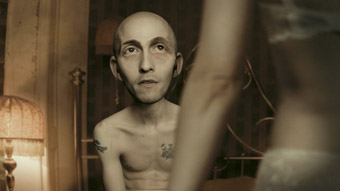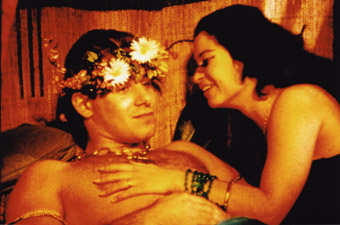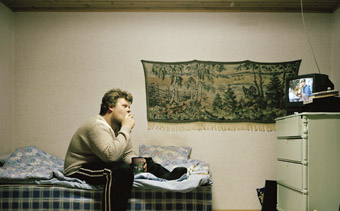 |
Metropia |
I first met Sargeant in 2000 when he brought the Beat film retrospective to the Brisbane International Film Festival (BIFF), one of the festival’s many incredible programs over the last decade. He met Richard Sowada, who “was instrumental in bringing me to Australia.” Sowada, now Head of Film programs at the Australian Centre for the Moving Image (ACMI), had been the founder of the REV fest, now the Revelation Film Festival, one of Australia’s most important screen cultural events. Sargeant spoke to me about life in his third year at the festival.
A festival programmer today has to juggle a lot of different things—what’s the most interesting thing about working on REV for you?
It’s interesting, because it has to embrace different, simultaneous discourses. There’s the ‘underground’ thing, but that is more of a minority interest. You also have to make sure people come and you screen larger films. I’ve always got to be programming for that combination. For example, this year we’re showing Mike Kuchar’s film, Sins of the Fleshapoids, a work which will be unknown to many people, and is pure 60s underground cinema. On the other hand we’re showing a documentary about The Doors called When You’re Strange. It’s different because it doesn’t have Ray Manzarek talking on about the past. Instead it’s got hitherto unseen footage and music all the way through. That’s a lot more of an accessible film, a more recognisable festival title, and I imagine other festivals will pick it up too. For me all kinds of films are important in the mix.
 |
Sins of the Fleshapoids |
Tell me about your work on the Magickal Songs, Mythical Histories and Fictitious Truths program for the 2010 Biennale of Sydney?
I found out there was a meta-thematic running through the Biennale based on Harry Smith, who I’ve written about. Fairly early on I discussed a list of films that would go hand in hand with these themes drawn from Harry’s work, which, if you are familiar with it, offers a perfect starting-point for so many different cultural possibilities. It’s been a great experience, to devise a screenings program around Smith and exciting to extend it to include experimental performers such as Lawrence English and Noko, as well as films like the Ira Cohen documentary Kings With Straw Mats, the doco In The Realms of the Unreal about Henry Darger and Craig Baldwin’s Mock Up On Mu. And there’s the Nick Zedd film, War is Menstrual Envy—I’m pretty sure it’s never been screened in Australia before. It’s a psychedelic punk avant-garde film, pure mayhem and a beautiful piece of art cinema. I just thought it’s about time that film got seen and framed in a different context.
When I first met you at BIFF, film festivals were seriously carnivalesque affairs where a lot of fun and discussion was had, inside and outside the cinema. How have festivals changed? What’s the role of fun in all this?
A festival exists to show film and get people to think and share their experiences about cinema. As soon as people move away from that, I think there are problems. When I write about films or program them I try to frame them the way I see them. I don’t think film should be framed the way the marketing people of a film company want us to see them or the way certain theorists or historians have framed them. Of course, I don’t necessarily want people to agree with me. I want them to know why I think a film is interesting and go from there. It’s important as a curator to put one’s imprint on things. That said, I argue with the people involved in REV. It’s not like they all bow to my taste. Obviously people have different tastes. Part of the process of curating is negotiating, defending, justifying decisions, sometimes even with myself. If I am passionate I will argue down to the last minute about why I think that a film is good. It’s not that other people’s opinions aren’t valid. It’s that, I think, as a curator or as a writer on culture, that’s what you have to do, you have to stand up for things you like.
 |
The Living Room of the Nation |
I think it’s important to have a range of genres and styles and themes going on, it’s important to get that scope, not just be doing the same thing, or variations of the same thing. The ideal is to have diversity, not predictability. To be moving in all directions at once. What was the term Trans Media Exploration used? Quaquaversal. Trans Media were a 60s commune and art group; Genesis P-Orridge, later of Throbbing Gristle and Psychic TV was involved with them for a while. I like the idea of embracing the ‘quaquaversal.’ Or ideas like becoming. Those concepts of how to be fluid and flexible and move through an infinite number of possibilities.
Is that close to a philosophy of programming?
Philosophy is a bit of a problem for me, because if you seriously have a philosophy then I believe that you’ve got to destroy it. As soon as you have just one way of doing something you become conservative. And you have to avoid conservatism, and avoid your own conservative tendencies that allow you to fall back on the familiar or the safe. I think people become too cynical. It’s important to retain that freshness, that excitement and interest about things, to keep coming to them anew.
 |
Joanna Newsom, The Family Jams |
All the time. Because I’m always looking to find new things, new areas of interest. I’m always looking for new kicks, you know? I get bored easily and always want to find new stuff to amuse myself. I’m always finding things I like because I’m always looking for things.
I think one needs to approach one’s work with a kind of fury. By which I mean an intensity. It’s important to avoid being lazy and not engaging. It’s also essential to realise that just because you can see one minute of something on YouTube doesn’t mean you’ve seen it, there’s so much more out there.
I’m really interested in the things that are excluded, for example recently when people were talking about Australian cinema, I was interested in what was left out of the definition. As soon as I know there’s something they’re not telling me, I always want to know what it is. (See Sargeant’s “Australian Film: A Wider Screen,” RT95)
I think it’s important to remember that culture is like an iceberg: the little bit that peeks above the surface is what everyone’s talking about. But what’s interesting is what’s under the surface. Interestingly, on some icebergs there’s even more under the surface than usual; sailors call these icebergs growlers. To me that is the perfect metaphor; there’s this huge thing growling underneath and this is what I want to know about. Most people just stick with what’s above the surface. But knowing what’s out there, wondering about it all the time, makes me want to look deeper.
* * *
advance notice
Jack Sargeant tells us that his 2010 Revelation Film Festival will include Mike Kuchar’s Sins of the Fleshapoids; a Philip K Dick-style science fiction animated feature, Metropia; an Irish post-apocalyptic melodrama, One Hundred Mornings; a Russ Meyer double bill; a WA feature, The Sculptor; the hip LA coming of age film, We Are The Mods; The Family Jams, a documentary about alt.folk, Joanna Newsom et al; Living Room of the Nation, a poetic visit to six Finnish living rooms; Double Take, the much acclaimed and witty experimental examination of Alfred Hitchcock and Cold War Politics by Belgian artist Johan Grimonprez; and the documentary Reporter, about a committed US newsman in the Congo.
Revelation Film Festival, Perth, July 8-18; www.revelationfilmfest.org
RealTime issue #97 June-July 2010 pg. 21
© Danni Zuvela; for permission to reproduce apply to [email protected]








 back
back